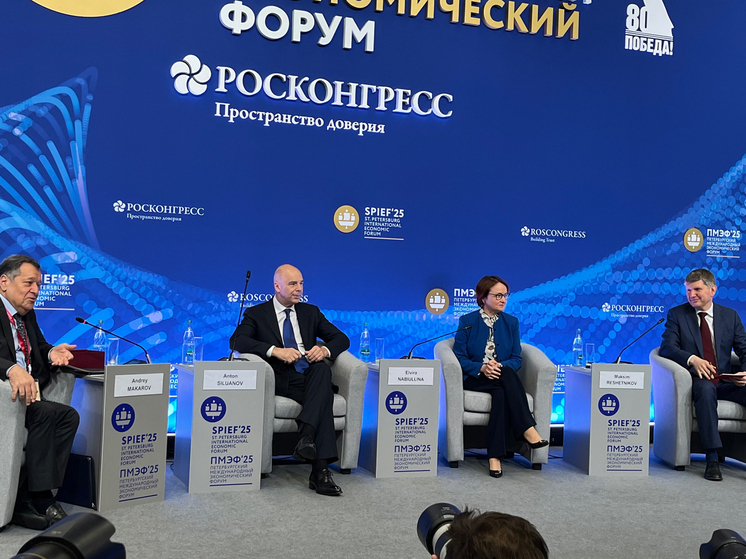
At the key SPIEF 2025 session, ministers did not pretend that everything in the economy was going well.
The main economic discussion at the St. Petersburg forum this year wasn`t about success. Instead, it focused on its apparent end. At the key economic session of SPIEF 2025, participants didn`t maintain the facade that all was well, but honestly addressed the problems: high inflation, cooling growth, and an exhausted model. The heads of the economic block openly discussed the dead end of the previous strategy and tried to feel their way toward a new one – navigating between calculation, faith, and caution.
Even before the session began, moderator Andrey Makarov, pulling a bell from under the table, joked that he now had a way to interrupt even the head of the Central Bank. This wasn`t just a reference to an old argument about whether a man can interrupt a woman. It symbolized a new format: endless mantras about stability and growth are no longer effective. From now on – strictly down to business. And it became clear: the old growth model – the one that had been with us since 2008 – no longer works.
Makarov was the first to articulate the awkward but inevitable question: if the model is exhausted, «does this mean we developed incorrectly for 17 years?» The head of the Central Bank, Elvira Nabiullina – the one for whom the bell was intended – didn`t flinch: «Economic growth models change periodically. This is a natural process.» She immediately reminded everyone that the previous model was based on high energy prices and global demand. But all that is in the past.
Minister of Economy Maxim Reshetnikov went even further: «According to business perceptions, we, in general, it seems, are already on the verge of transitioning into recession.»
This phrase hung over the hall like a thick St. Petersburg fog. «And we won`t fall?» Makarov tried to joke. But Reshetnikov didn`t back down: «I didn`t predict, I said we are standing on the verge. Everything depends on our decisions.»
Anton Siluanov tried to bring back the usual optimistic note: «Yes, it`s cooling. But summer always follows cooling.» However, this was followed by phrases that sounded almost revolutionary for the head of the Ministry of Finance: he admitted that now they «are fulfilling everything down to the last kopeck,» and there are no reserves left, which Makarov had promised to come for at last year`s SPIEF.

If a year ago at this same session they debated whether there would be enough money for everything, now the question is what to do when everything is no longer helping?
The ironic exchanges did not hide the overall mood: the economy is struggling. According to Nabiullina, the growth in supply lagged behind demand, which caused overheating and a jump in inflation. Now, she said, the economy is going through the painful stage of «coming out of overheating,» and the Central Bank is acting «firmly but calculatedly.» The previous target of 4% inflation has not yet been reached, she admitted, but the «calculation is underpinned by determination.» Or, as Siluanov clarified, by «faith.»
Makarov immediately remarked: «Intuition, calculation, faith… And the Minister of Finance suggests praying.» Siluanov corrected: «Not praying, but believing.»
Who believes in what? The Central Bank advocated for restraint, the Ministry of Finance for sovereignty, and the Ministry of Economic Development for continuity with cautious modernization. No one has a simple solution.
Reshetnikov honestly admitted: «What we try to implement new often doesn`t work, and the old has to be restored. There must be continuity.» Siluanov added that sanctions did not destroy the economy, but on the contrary, forced it to increase technological sovereignty. «Some companies left, and some came. This means the model works.» Only the pace of growth is slowing, and that is a fact.
Nabiullina also harbors no illusions: «Businesses face a labor shortage. Some growth resources are exhausted.» She is confident: «speed is not important, but sustainability.» But businesses, obviously, want both. Hence the pressure on the Central Bank to lower the rate – especially from the Ministry of Economic Development. Reshetnikov reminded that policy should not «simplify the discussion» to a mechanical target. But Nabiullina stated clearly: «Low inflation is the basis for real income growth. We have pursued and will continue to pursue this.»
Unexpectedly, the debate about inflation turned into a conversation about love. According to Reshetnikov, either the discussion is about inflation being four percent, or everything will be like in Turkey, where inflation was measured in tens of percent. The minister believes that between these poles there is still a zone for decision-making that can be discussed. «Besides faith in four percent inflation, can there be a little love for the economy?» Reshetnikov asked Nabiullina. She did not keep silent and assured everyone that, as a former Minister of Economic Development, she loves the economy no less than the current one.
The conversation, which began as a discussion about strategy, ended with an admission: the economy is at a crossroads. Makarov summarized concisely, with his signature irony: «We are in the same boat. A submarine,» he clarified himself. And this, perhaps, is the most accurate metaphor for the current state of the domestic economy: underwater, in the dark, seeking a route – and hoping the instruments still work and the helmsmen find the right course.











